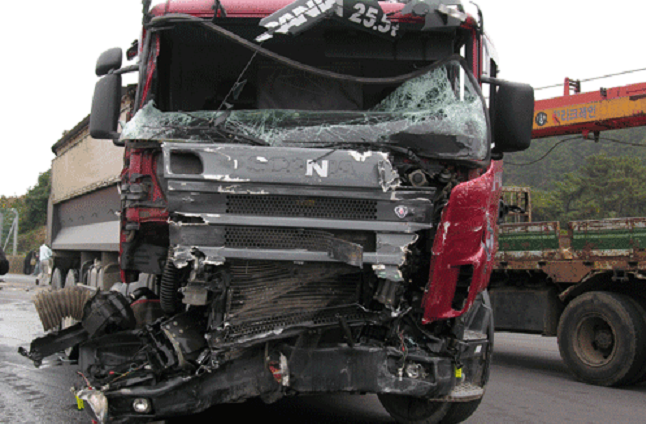hankyoreh
Links to other country sites 다른 나라 사이트 링크
Supreme Court rules deprecation costs should be included in car wreck compensation

When calculating how much money should be paid in damages after car accidents, not only the cost of repairs but also the depreciation of the value of the car resulting from parts that cannot be restored to their original condition must also be included, South Korea’s Supreme Court has ruled.
On July 21, the first panel of the Supreme Court overturned a ruling by a lower court that had denied the request of an individual surnamed Kim to be compensated for the reduced trade-in value of a vehicle and remanded the case to a panel of the Chuncheon District Court. After a traffic accident between dump trucks at a four-way stop in the Hyundai Steel factory in Dangjin, South Chungcheong Province, in which his vehicle was damaged, Kim had sued “T” Fire and Marine Insurance to compensate him for the damage.
“Normal damage resulting from illegal behavior includes not only the cost of repairs but also the reduction in trade-in value when it is impossible for damage to be repaired,” the court explained in its ruling. “When there is a major accident in which important parts of the vehicle’s frame are damaged, there are typically still parts that cannot be repaired or restored to their original condition even after the technically possible repairs have been completed. Such damage that causes the vehicle’s value to decrease also counts as normal damage.”
“Even after repairs were completed on his damaged vehicle, Kim argued that he had suffered a loss because the trade-in value of the vehicle at the time of sale decreased as a result of several kinds of damage recorded in the vehicle’s performance and condition inspection log. The lower courts ought to have determined whether those kinds of damage were major problems with the vehicle’s frame and whether Kim had suffered a loss when the value of his vehicle fell because it could not be repaired or restored to its original state.”
The lower court and appeals court acknowledged that Kim should be compensated for the repairs and for the loss of income resulting from the interruption of his work, but they rejected Kim’s request to be paid 15 million won (US$1,340) for the reduced trade-in value of his vehicle, citing “a lack of concrete evidence.”
By Yeo Hyeon-ho, senior staff writer
Please direct questions or comments to [english@hani.co.kr]

Editorial・opinion
![[Column] Has Korea, too, crossed the Rubicon on China? [Column] Has Korea, too, crossed the Rubicon on China?](https://flexible.img.hani.co.kr/flexible/normal/500/300/imgdb/original/2024/0419/9317135153409185.jpg) [Column] Has Korea, too, crossed the Rubicon on China?
[Column] Has Korea, too, crossed the Rubicon on China?![[Correspondent’s column] In Japan’s alliance with US, echoes of its past alliances with UK [Correspondent’s column] In Japan’s alliance with US, echoes of its past alliances with UK](https://flexible.img.hani.co.kr/flexible/normal/500/300/imgdb/original/2024/0419/2317135166563519.jpg) [Correspondent’s column] In Japan’s alliance with US, echoes of its past alliances with UK
[Correspondent’s column] In Japan’s alliance with US, echoes of its past alliances with UK- [Editorial] Does Yoon think the Korean public is wrong?
- [Editorial] As it bolsters its alliance with US, Japan must be accountable for past
- [Guest essay] Amending the Constitution is Yoon’s key to leaving office in public’s good graces
- [Editorial] 10 years on, lessons of Sewol tragedy must never be forgotten
- [Column] A death blow to Korea’s prosecutor politics
- [Correspondent’s column] The US and the end of Japanese pacifism
- [Guest essay] How Korea turned its trainee doctors into monsters
- [Guest essay] As someone who helped forge Seoul-Moscow ties, their status today troubles me
Most viewed articles
- 1[Column] The clock is ticking for Korea’s first lady
- 2After 2 months of delayed, denied medical care, Koreans worry worst may be yet to come
- 3Hong Se-hwa, voice for tolerance whose memoir of exile touched a chord, dies at 76
- 4Samsung barricades office as unionized workers strike for better conditions
- 5[Column] Has Korea, too, crossed the Rubicon on China?
- 6US overtakes China as Korea’s top export market, prompting trade sanction jitters
- 7[Editorial] As it bolsters its alliance with US, Japan must be accountable for past
- 8[Correspondent’s column] In Japan’s alliance with US, echoes of its past alliances with UK
- 9All eyes on Xiaomi after it pulls off EV that Apple couldn’t
- 10[Guest essay] How Korea turned its trainee doctors into monsters